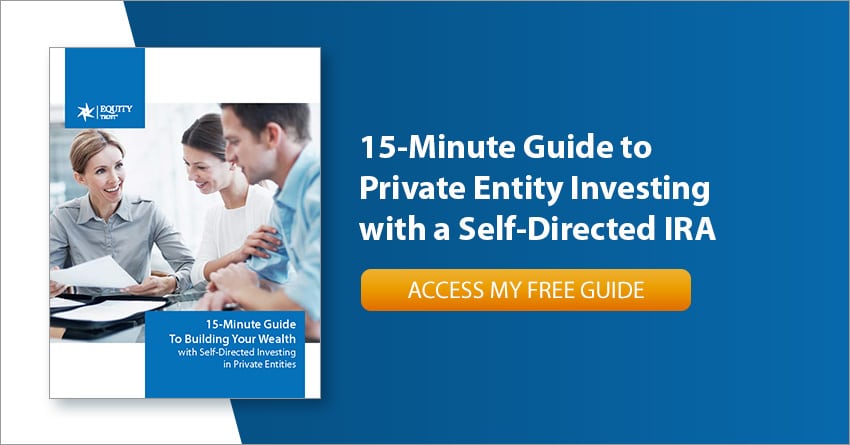Nearly Limitless Options
in One IRA
Invest in both traditional and alternative assets with a single custodian – ready to go beyond a self-directed IRA?
Investor Insights Blog|“Due Diligence” and Investments: What You Really Need to Know
Private Equity and Entity Investing

The following was written by guest blogger Bruce Roberts, Founder and CEO of Carofin.
It’s hard enough keeping this baby in running condition.
But, to get the best performance, you work with your mechanic closely, asking additional questions, avoiding risks where you can. While you rely on your mechanic, it just makes sense for you to have a deeper understanding…
The same should be true of your investments.
Here are a few guidelines to help keep your alternative investments from “ending up in the ditch.”
Before making an alternative investment, Investors should analyze and verify information provided to them by the Issuer. Typically, an Investor will be presented with the Offering Documents, such as a Private Placement Memorandum or other Summary Offering Material (SOM). But due diligence involves diving more deeply into Offering materials. Investors should understand all areas of the business — and the backgrounds of the key individuals managing the business – before proceeding.
Due diligence regarding investments in private companies means investigating all aspects of the business and the Security being offered. This includes independently evaluating whether the statements in the Offering Documents are complete, consistent, and accurate, with no material facts omitted. It takes more work by the Investor…but it’s worth it!
If you haven’t read “Perspectives on Private Investments and Crowdfunding,” you might refer to it for more background. But, in short, the Securities Act of 1933 has fraud provisions which require the Issuer and its representatives to disclose all material facts accurately and fully.
If Issuers are not willing (or not able) to discuss their business in greater detail than is provided in the Offering Documents, even when under the protection of a Non-Disclosure Agreement (NDA) between the Issuer and the Investor, they should be treated with great caution.
The information that has been collected during the due diligence process (i.e. before the investment is made available to Investors) should also be readily available to potential Investors. With the internet, this is relatively easy to do. This information often is provided to prospective Investors via a web-based portal, enabling them to make more informed decisions.
The SEC publishes a questionnaire under Rule 506 section of Regulation D (Reg D) called Rule 506 Disqualification Questionnaire (also informally called the “Bad Actor Questionnaire”) which key persons are required to complete.
A background search for the Issuer’s key persons (as defined in the Bad Actor Questionnaire) should include:
Areas for analysis include company overview (product/service opportunity), financing overview, market overview (customers/competition), management, Investors, employees and related parties, financial information, corporate documents of the company and subsidiaries, previous financings and capital structure, material contracts and agreements, litigation, property/intellectual property, taxation, insurance and liability, acquisition, partnership or joint venture agreements, governmental regulations and filings, and operations.
While the emphasis during a due diligence analysis will naturally be more heavily weighted to the specifics of the potential investment, areas that may originally seem less significant can ultimately have a significantly detrimental impact on an investment if they are not addressed properly.
To learn about specifics within each of the categories mentioned above, please read on.

Company overview (product/service opportunity): When analyzing a company, review its business plan to understand its products or services and why it stands out from its competitors. Understand each product or service, how the Company plans to bring each to market, and what is the production process or service offering platform. What are its production challenges, and to what degree has the market accepted its products/services? Review marketing studies, consulting studies or reports and conduct background searches.
Financing overview: An Investor should ask why the Company is raising capital now. What is driving the timing behind the raise? How does Management plan to use the funds? What is the projected Capitalization of the Company before and after the funds have been raised?
If the Company can project exit strategies, who might be the potential buyers, or might an initial public offering be a viable strategy? What return should you expect on this investment and over what period?
Market Overview: Are there relevant articles or marketing studies relating to the Company or the industry? Is there information supporting the aggregate market size? What are the demand drivers? Can the Issuer provide a list of near-term customers and the top 20 customers that includes sales concentration and contract terms?
While the Investor may not have direct access to this information, try to determine, among other things, what is the top customers’ purchasing decision process and whether they are satisfied with the Company’s products/services/payment/delivery, etc.
When considering the competition, what do you know about their competitors? Does the Company have defensible barriers to entry? In other words, would it be tough for a competitor to enter the market? What are their key advantages? Can you learn more about the company from other industry participants? Is their intellectual property protected?
Management, investors, employees and related parties: Have you reviewed their organization chart and biographical information? How complete is it? Are there any concerns relating to employees, key managers or current Investors?
Financial information: Have you reviewed the audited (or, if unavailable, unaudited) financials, projections, changes in product or service margins, changes in Accounts Receivable or Accounts Payable? Do you know what are the terms of the debt that the Company has on its books – is it able to meet those obligations with its Operating Income? Does the Company have a good relationship with its lenders? What Liens are on the Company’s assets?
Corporate documents of the company and subsidiaries: Check to make sure the Articles of Incorporation / Operating Agreements, corporate bylaws, Board meeting minutes etc. are available to uncover any potential issues.
Previous financings and capital structure: Have there been any previously issued Securities, Convertible debt instruments, or other items that may affect the number of shares outstanding and, therefore, your prospective percent ownership in the Company? What does the Capitalization Table look like?
Material contracts and agreements: Are there any in place that are of consequence to the investor?
Litigation: An Investor should learn about any pending or prior lawsuits involving the Company or the Founders.
Property/Intellectual Property: The Company should provide a list of real property it owns with titles, deeds of trust, mortgages, etc. It should also provide documents relating to proprietary technology and copyright or patent filings to determine whether the intellectual property is protected.
Taxation: Are there any issues regarding the Company or the Principals relating to the federal or state tax authorities? The Company should be able to provide evidence that it is current with its taxes.
Insurance and liability: Does the Company carry insurance policies covering property, liabilities and operations? Are there any other insurance policies in force, such as “key man” policies or director indemnification policies?
Acquisition, Partnership or Joint Venture Agreements : Are there any material agreements in place or documents pertaining to potential acquisitions or alliances?
Governmental regulations and filings: Are there any issues relating to government regulations, filings, permits, licenses or other that are material for an Investor to understand?
Operations: Are the facility, machinery and equipment in operational order? Has the Company established Key Performance Indicators to manage and improve efficiency?
If an online portal exists, an Investor should look for:
Investing in a private Company is highly risky. You should verify as much information as possible to avoid misrepresenting the facts or to detect fraud, both about the investment and the Principals behind the investment.
Don’t be shy about asking questions about the contents of the due diligence files. Your mechanic, if smart, wants to avoid surprises every time you get behind the wheel.
Bruce Roberts is the Founder and CEO of Carofin and has over 35 years’ experience as an investment banker and entrepreneur. 1987 – 1994, Mr. Roberts was at The First Boston Corporation (now Credit Suisse) in New York as a Director in the Investment Banking Department, supporting both corporate and government clients throughout the pacific region and raising in excess of $30 billion for his clients. He started his investment banking career at Bank of America in San Francisco in 1983. Prior to his investment banking career, he served as an officer in the U.S. Navy (UDT / SEAL).
Carofin is a FINRA broker-dealer specializing in the private finance of small to medium businesses in the U.S. Carofin and its affiliates have raised over $1.2 billion of equity and debt for smaller private businesses through over 200 securities offerings since 1996. We’ve learned a lot about financing SMB. Those lessons arhttp://go.trustetc.com/R0064m1YFj0020z0Y6M2xB0e reflected in every security we offer to private investors and in our continuing investor support after they’ve invested in our offerings.
Can my IRA purchase an interest in a subchapter S corporation?
Copyright Carofin, LLC 2020
Securities offered through Carofin, LLC, Member FINRA/SIPC. Carofin and Carolina Financial Securities are affiliated Broker-Dealers and subsidiaries of Carolina Financial Group, LLC. This material is published for residents of the United States only. Representatives may only conduct business with residents of the states and jurisdictions in which they are properly registered. Therefore, a response to a request for information may be delayed until appropriate registration is obtained or exemption from registration is determined. Not all services referenced in this material are available in every state and through every representative listed. For additional information, please contact Craig Gilmore at 828.393.0088 x 520 and/or [email protected].
Private placements are high risk and illiquid investments. As with other investments, you can lose some or all your investment. Nothing in this material should be interpreted to state or imply that past results are an indication of future performance nor should it be interpreted that FINRA, the SEC or any other securities regulator approves of any of these securities. Additionally, there are no warranties expressed or implied as to accuracy, completeness, or results obtained from any information provided in this material. Investing in private securities transactions bears risk, in part due to the following factors: there is no secondary market for the securities; there is credit risk; where there is collateral as security for the investment, its value may be impaired if it is sold.
Bruce Roberts not an employee of Equity Trust Company. Opinions or ideas expressed are not necessarily those of Equity Trust Company nor do they reflect their views or endorsement. These materials are for informational purposes only. Equity Trust Company, and their affiliates, representatives and officers do not provide legal or tax advice. Investing involves risk, including possible loss of principal.
Equity Trust Company is a directed custodian and does not provide tax, legal or investment advice. Any information communicated by Equity Trust is for educational purposes only, and should not be construed as tax, legal or investment advice. Whenever making an investment decision, please consult with your tax attorney or financial professional.
You are leaving trustetc.com to enter the ETC Brokerage Services (Member FINRA/SIPC) website (etcbrokerage.com), the registered broker-dealer affiliate of Equity Trust Company. ETC Brokerage Services provides access to brokerage and investment products which ARE NOT FDIC insured. ETC Brokerage does not provide investment advice or recommendations as to any investment. All investments are selected and made solely by self-directed account owners.
Continue